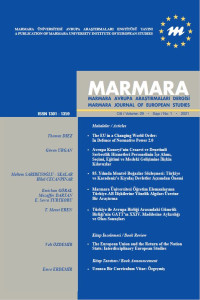Abstract
Bu makale, Soğuk Savaş’ın hemen ardından “liberal moment”in sona ermesinden sonra, çoğullaşan bir uluslararası toplumda Avrupa Birliği’nin (AB) normatif bir güç olarak rolünü tartışmaktadır. Makale, geleneksel normatif güç anlayışının (NPE 1.0), ötekileştirme uygulamalarıyla iç içe olması ve AB'nin kendi eksikliklerinin göz ardı edilmesine yol açması sebebiyle, normatif açıdan sorunlu olduğunu ileri sürmektedir. Bu nedenle NPE 1.0’ın sona eriyor oluşu, normatif gücü terk etmek yerine yeniden ifade etmek için bir fırsat olarak görülebilir. Makale, Komisyon Başkanı von der Leyen’in “jeopolitik Komisyon” ve AB Küresel Stratejisi’nin “ilkeli pragmatizm” kavramı da dahil olmak üzere, AB’nin kendi resmi anlatısını üzerine kurduğu unsurları yeniden dile getirme girişiminde bulunmaktadır. Von der Leyen Komisyonu bir gerçekçiliğe dönüş gösterse de makalede, böyle bir eğilimin tartışmalı ve alternatiflere açık olmaya devam ettiği varsayımına dayanılmaktadır.
References
- Adler, E. and Crawford, B. (2006) “Normative Power: The European Practice of Region Building and the Case of the Euro-Mediterranean Partnership”, in E. Adler, F. Bicchi, B. Crawford and R. A. Del Sarto (eds.) The Convergence of Civilizations: Constructing a Mediterranean Region, (Toronto: University of Toronto Press), pp. 3-48.
- Afionis, S. and Stringer, L. C. (2012) “European Union leadership in biofuels regulation: Europe as a normative power?”, Journal of Cleaner Production, (32): 114-123.
- Ahrens, B. (2018a) AmbigEUity-The EU and the Solidarisation of International Society, Tübingen: Universität Tübingen, PhD thesis.
Abstract
This paper discusses the role of the European Union (EU) as a normative power in a pluralising international society after the demise of the “liberal moment” in the immediate aftermath of the Cold War. It suggests that the traditional understanding of normative power (NPE 1.0) was normatively problematic as it was infused with othering practices and led to the neglect of the EU’s own shortcomings. Thus, the demise of NPE 1.0 may be seen as an opportunity to re-articulate normative power rather than abandon it. The paper attempts such a re-articulation building on elements in the EU’s own official narrative, including Commission President von der Leyen’s “geopolitical Commission” and the concept of “principled pragmatism” in the EU Global Strategy. It is premised on the assumption that although the von der Leyen Commission seems to have taken a realist turn, such a turn continues to be contested and open to alternatives.
References
- Adler, E. and Crawford, B. (2006) “Normative Power: The European Practice of Region Building and the Case of the Euro-Mediterranean Partnership”, in E. Adler, F. Bicchi, B. Crawford and R. A. Del Sarto (eds.) The Convergence of Civilizations: Constructing a Mediterranean Region, (Toronto: University of Toronto Press), pp. 3-48.
- Afionis, S. and Stringer, L. C. (2012) “European Union leadership in biofuels regulation: Europe as a normative power?”, Journal of Cleaner Production, (32): 114-123.
- Ahrens, B. (2018a) AmbigEUity-The EU and the Solidarisation of International Society, Tübingen: Universität Tübingen, PhD thesis.
Details
| Primary Language | English |
|---|---|
| Journal Section | Makaleler |
| Authors | |
| Publication Date | June 30, 2021 |
| Published in Issue | Year 2021 Volume: 29 Issue: 1 |

